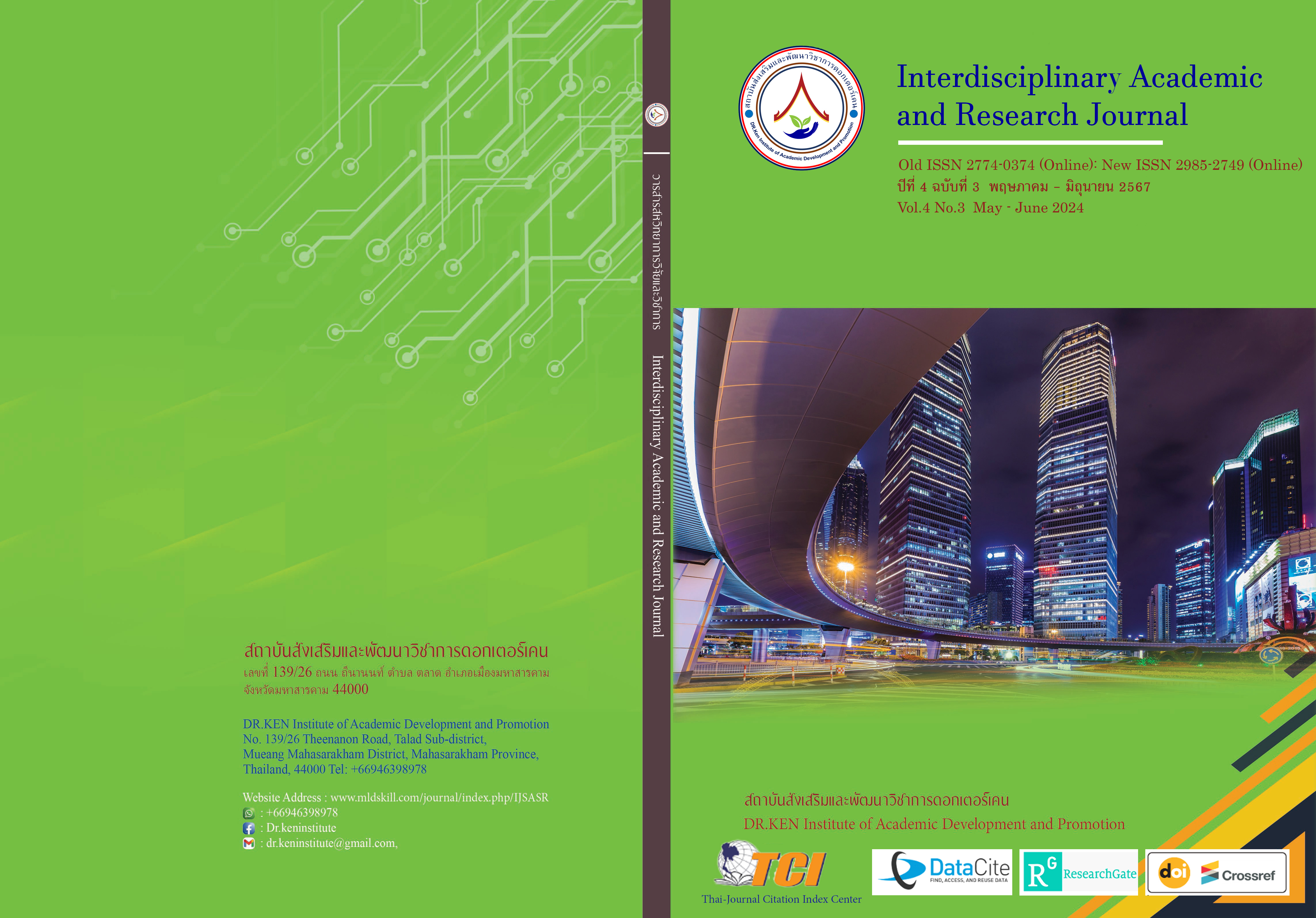Development Marketing Strategies of Thai Vocational Education Institutions
DOI:
https://doi.org/10.60027/iarj.2024.276352Keywords:
Marketing Strategies;, Vocational Education Institutions; , 7Ps of MarketingAbstract
Background and Aims: Marketing strategies of vocational education institutions in Thailand focus on growth and self-improvement to establish a strong presence in the market and compete in various professions. These institutions must utilize marketing strategies to offer attractive proposals that meet customers' needs. This is achieved using the 7Ps of marketing (Product, Price, Place, Promotion, People, Process, Physical) to design vocational education courses that align with the labor market's requirements, thereby increasing opportunities to enter the workforce and sustain growth in the future. Additionally, understanding the target audience's needs and creating appropriate communication media is essential in increasing interest in the courses offered.
Methodology: This study studied relevant academic documents and presented them descriptively according to the objectives.
Results: Marketing strategies of Thai vocational education institutions can be carried out according to the 7P's marketing strategy concept, consisting of (1) Curriculum (Programs) (2) Tuition (Price) (3) Place (Place) (4) Public relations (Promotion) (5) Personnel (6) Production processes (Processes) and (7) Physical environment (Physical facilities)
Conclusion: By following the thorough framework of the 7Ps marketing strategy concept, Thai vocational education institutions can effectively shape their marketing strategies. To achieve their goals, this calls for close attention to the curriculum, costs, placement, promotion, staff, procedures, and physical facilities.
References
กชกร โสไกรรังคะภูติสรชาติ. (2565). ปัจจัยส่วนประสมทางการตลาด (7P’s) ที่มีอิทธิพลต่อการตัดสินใจเข้าศึกษาต่อในระดับอุดมศึกษาระบบการศึกษาทางไกลในจังหวัดชลบุรี. วารสารวิจัยวิทยาการจัดการ มหาวิทยาลัยราชภัฏสุรินทร์, 6(3), 43-56.
กรมการจัดหางาน, (2557). แผนปฏิบัติราชการ 4 ปี พ.ศ.2554 - 2557 กรมการจัดหางาน. กรุงเทพฯ: กรมการจัดหางาน.
เกรียงไกร ปัญญาประเสริฐ. (2564). กุลธนะแพทย์จุฬาพรรณภรณ์..การบริหารงานวิทยาลัยอาชีวศึกษาของผู้บริหารสถานศึกษา. วารสาร มจร อุบลปริทรรศน์, 6(1), 449-568.
เกรียงศักดิ์ เจริญวงศ์ศักดิ์. (2562). เรียนให้รู้: ใช้ข้อมูลอย่างผู้ชนะ. พิมพ์ครั้งที่ 2. กรุงเทพฯ: ซัคเซส มีเดีย
นพดล สุตันติวณิชย์กุล. (2554). การศึกษาความพร้อมด้านเทคโนโลยีของสถานศึกษาอาชีวศึกษาไทย เพื่อรองรับการเป็นประชาคมเศรษฐกิจอาเซียน. กรุงเทพฯ:มหาวิทยาลัยธุรกิจบัณฑิตย์.
นวลอนงค์ อุชุภาพ. (2562). กลยุทธ์การตลาดเพื่อการบริหารอาชีวศึกษาในยุคไทยแลนด์ 4.0. วารสารศึกษาศาสตร์ มหาวิทยาลัยสงขลานครินทร์ วิทยาเขตปัตตานี. 30(1), 1- 10
บุญเกิด กลมทุกสิ่ง. (2555). การพัฒนาหลักสูตรฝึกอบรมภาษาอังกฤษสำหรับผู้บริหารสถานศึกษาขั้นพื้นฐาน สังกัดสำนักงานเขตพื้นที่การศึกษาประถมศึกษาชลบุรี เขต 1. ดุษฎีนิพนธ์ ปรัชญาดุษฎีบัณฑิต สาขาวิชาการบริหารการศึกษา.ชลบุรี: มหาวิทยาลัยบูรพา.
ปรัชญานันท์ นิลสุข. (2560). อาชีวศึกษากับประเทศไทย 4.0. วารสารอาชีวะก้าวไกล, 3(2),1-6.
พกานต์ ตันติกรพรรณ และ ศศิวิมล สุขบท. (2561). องค์ประกอบการจัดการเชิงการตลาดของสถานศึกษาอาชีวะเอกชน เพื่อลดการขาดแคลนแรงงานภาคอุตสาหกรรม เขตภาคใต้ประเทศไทย. วารสารวิทยบริการ มหาวิทยาลัยสงขลานครินทร์, 29(1), 66-77
ภาวิณีย์ มาตแม้น. (2557). กลยุทธ์การตลาดเพื่อพัฒนาภาพลักษณ์ของวิทยาลัยอาชีวศึกษาเอกชนในประเทศไทย. วิทยานิพนธ์ปรัชญาดุษฎีบัณฑิต: บัณฑิตวิทยาลัย มหาวิทยาลัยสยาม.
มณพิไลย นรสิงห์. (2560). การพัฒนาคนเพื่อการขับเคลื่อนประเทศไทยไปสู่ Thailand 4.0. Retrieved on 5 April 2018 from: https://www.nectec.or.th/news.
วรากร ทรัพย์วิระปกรณ์ และพัชรี ถุงแก้ว. (2559). ความสุขของบุคลากรสายสนับสนุน: กรณีศึกษาคณะศึกษาศาสตร์ มหาวิทยาลัยบูรพา. วารสารศึกษาศาสตร์, 27(1), 113-129.
สรวงอัยย์ อนันทวิจักษณ์. (2561). คุณลักษณะผู้นำองค์กรธุรกิจในยุคไทยแลนด์4.0 วารสารศึกษาศาสตร์มหาวิทยาลัยสงขลานครินทร์ วิทยาเขตปัตตานี, 29 (1), 1-18
สำนักงานคณะกรรมการกฤษฎีกา. (2553). พระราชบัญญัติการศึกษาแห่งชาติพ.ศ. 2542 แก้ไข เพิ่มเติม (ฉบับที่ 2) พ.ศ. 2545 (ฉบับที่ 3) พ.ศ. 2553. ราชกิจจานุเบกษา. เล่ม 127/ตอนที่ 45ก/หน้า1/22 กรกฎาคม 2553.
สำนักงานคณะกรรมการพัฒนาเศรษฐกิจและสังคมแห่งชาติ. (2559). รายงานประจำปี 2559 สำนักงานคณะกรรมการพัฒนาการเศรษฐกิจและสังคมแห่งชาติ. กรุงเทพฯ: สำนักงานคณะกรรมการพัฒนาเศรษฐกิจและสังคมแห่งชาติ.
สำนักงานปลัดกระทรวงศึกษาธิการ. (2559). แผนปฏิบัติราชการประจำปีงบประมาณ 2560 ของสำนักงานปลัดกระทรวงศึกษาธิการ. กรุงเทพฯ: สำนักนโยบายและยุทธศาสตร์
สำนักงานเลขาธิการสภาการศึกษา. (2553). การบรรยายทางวิชาการเพื่อสร้างควาตระหนักเรื่อง การก้าวสู่ประชาคมอาเซียน. กรุงเทพฯ: กลุ่มยุทธศาสตร์ความร่วมมือระหว่างประเทศ,
สำนักงานเลขาธิการสภาการศึกษา. (2562). นโยบายและยุทธศาสตร์การปฏิรูปการศึกษาใน. ทศวรรษที่สองด้านการพัฒนาอาชีวศึกษา. กรุงเทพฯ: สำนักงานเลขาธิการสภา การศึกษา.
สำนักงานสถิติแห่งชาติ. (2557). สรุปผลที่สำคัญการสํารวจภาวะการทำงานของประชากร พ.ศ. 2557. กรุงเทพฯ: สำนักงานสถิติแห่งชาติ.
สุภาภรณ์ ตั้งดำเนินสวัสดิ์, พิภู ผ่องสุวรรณ, สุขุม เฉลยทรัพย์ และศิโรจน์ ผลพันธิน. (2562). ส่วนประสมการตลาด บริการสำหรับโรงเรียนเอกชน. วารสารมหาจุฬาวิชาการ, 7(1), 18-36.
หอมจันทร์ จรรยาเอก ธีระ รุญเจริญ จําเริญรัตน์ จิตต์จิรจรรย์ และ สงวนพงศ์ ชวนชม. (2560). กลยุทธ์การพัฒนาวิทยาลัยอาชีวศึกษาเอกชนสู่ความเป็นสังคมแห่งการเรียนรู้. วารสารบริหารการศึกษา มหาวิทยาลัยขอนแก่น, 13 (1), 1-10.
อารียา สตารัตน์. (2556). การจัดสภาพแวดล้อมในสถานศึกษาของโรงเรียนสังกัดกรุงเทพมหานคร สำนักงานเขตราชเทวี. สารนิพนธ์การศึกษามหาบัณฑิต สาขาวิชาการบริหารการศึกษา มหาวิทยาลัยศรีนครินทรวิโรฒ.
เอกชัย กี่สุขพันธ์และคณะ. (2553). การบริหารการเปลี่ยนแปลง. กรุงเทพฯ: โรงพิมพ์แห่งจุฬาลงกรณ์มหาวิทยาลัย.
Filip, A. (2012). Marketing theory applicability in higher education. Procedia-social and Behavioral Sciences, 46, 912-916.
Hitt, M.A., Ireland, R.D., & Hoskisson, R.E. (2007). Strategic Management—Competitiveness and Globalization: Concepts and Cases. Thomas Higher Education.
Kotler, P. (2015). Marketing Management (Pearson Education). New Jersey: Prentice Hall.
Kotler, P. (1999). Marketing Management Millennium edition. New Jersey: Prentice Hall.
Kotler, P., & Fox, K. (1995). Strategic Marketing for Educational Institutions. Upper Saddle River, NJ: Prentice-Hall.
Kotler, Philip & Armstrong, Gary. (2006). Principles of Marketing. 11th edition. New Jersey: Pearson Prentice-Hall.
Masouleh, N.S., & Jooneghani, R.B. (2012). Autonomous learning: A teacher-less learning. Procedia - Social and Behavioral Sciences, 55, 835 – 842. https://doi.org/10.1016/j.sbspro.2012.09.570
Downloads
Published
How to Cite
Issue
Section
License
Copyright (c) 2024 Interdisciplinary Academic and Research Journal

This work is licensed under a Creative Commons Attribution-NonCommercial-NoDerivatives 4.0 International License.
Copyright on any article in the Interdisciplinary Academic and Research Journal is retained by the author(s) under the under the Creative Commons Attribution-NonCommercial-NoDerivatives 4.0 International License. Permission to use text, content, images, etc. of publication. Any user to read, download, copy, distribute, print, search, or link to the full texts of articles, crawl them for indexing, pass them as data to software, or use them for any other lawful purpose. But do not use it for commercial use or with the intent to benefit any business.
















.png)


